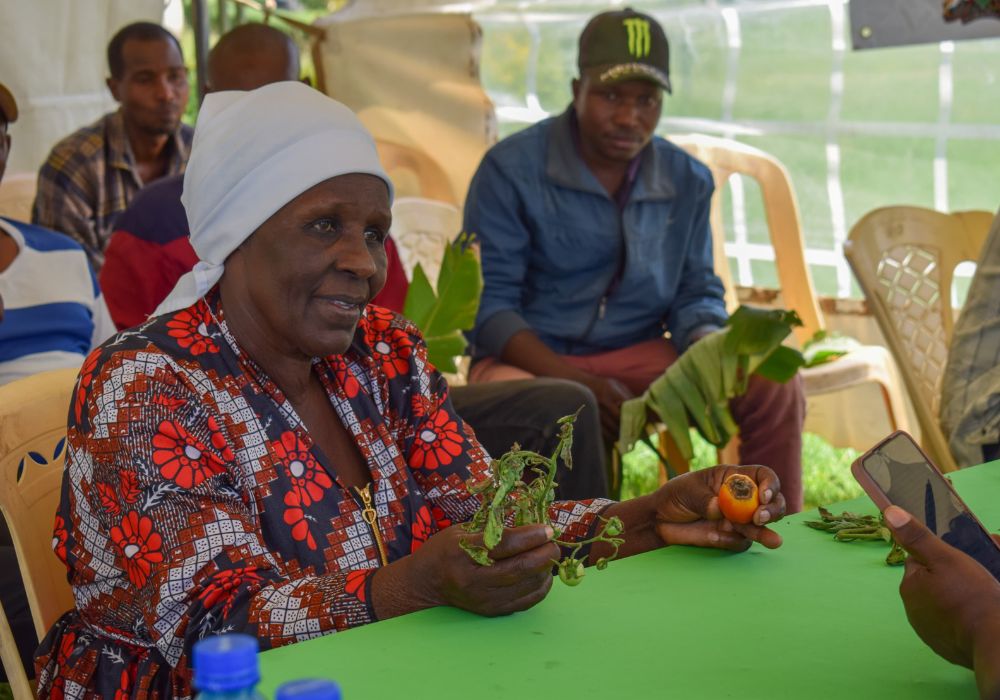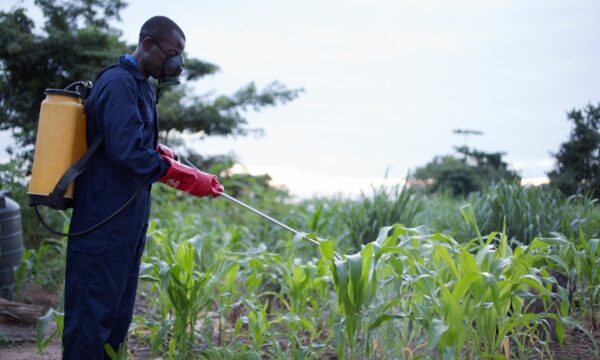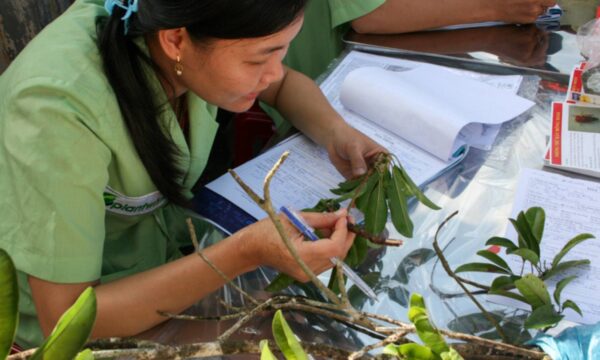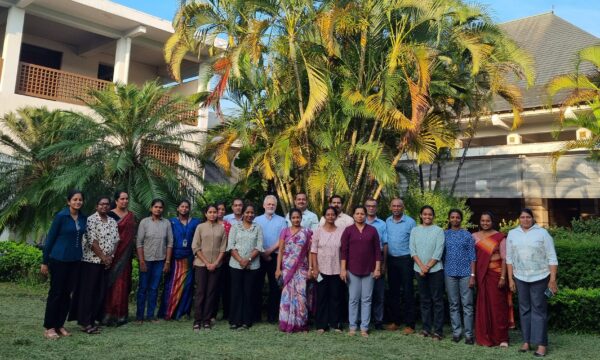Last year, CABI’s Digital Development team, in coordination with colleagues in Kenya and India, embarked on a journey to pilot an agri-advisory chatbot. This initiative was informed by prior stakeholder engagement activities under the Generative AI for Agriculture Advisory (GAIA) project, where key insights were gathered to ensure generative AI tools meet the needs of their intended users.

These insights were applied to our GenAI partnerships and the development of our own prototype chatbot. The prototype was tested initially using CABI advisory content on bananas and tomatoes in Kenya, and bananas and rice in India as the source material. By adopting a user-centric approach, the team sought to deliver a reliable and personalised advisory solution tailored to agricultural extension officers.
Following rigorous internal testing and iterative improvements, the team conducted a series of pilot testing workshops with extension officers who have received ‘plant doctor’ training under the PlantwisePlus programme in Kenya and India. These workshops were designed to assess the usability of the chatbot’s interface, the quality of its conversational functionality, and the relevance and accuracy of its advisory outputs.
Chatbot workshops in Kenya
In Kenya, two workshops were held in Nakuru and Taita Taveta counties on October 30th and November 6th, respectively. A total of 40 participants attended the one-day sessions across both locations. The majority of these participants had previously engaged in the stakeholder feedback workshops held earlier in June. Attendees included plant doctors and other representatives from the local extension system, students, and organisations such as KALRO and Infonet-Biovision.
Workshop in India
In India, a pilot testing workshop took place on November 12th in Pudukkottai, Tamil Nadu, in collaboration with the M S Swaminathan Research Foundation (MSSRF). The workshop brought together 41 participants, including 13 women, representing diverse stakeholder groups such as agro-dealers, plant doctors and other extension officers, the Ministry of Agriculture and Farmers Welfare, and farmer-producer organisations.
Chatbot workshop activities
The workshops in both Kenya and India began with introductory sessions that set the stage for testing. These sessions served as a recap of previous stakeholder feedback activities and provided updates on the chatbot’s development process. The team outlined how participants’ earlier insights had shaped the design of the chatbot prototype.
Participants were then grouped into pairs and guided through a series of structured testing activities. These activities combined user scenarios and pre-determined questions to encourage interaction with the chatbot. Recognising the importance of natural user experiences, the team incorporated both guided and unguided tasks, enabling participants to explore the chatbot’s capabilities intuitively. Feedback was gathered through in-person discussions and digital forms, ensuring a comprehensive understanding of user experiences.
Chatbot plant clinic testing
In addition to the workshops, the team sought to understand how the chatbot would perform in more dynamic, real-world scenarios. Under the PlantwisePlus programme, local agricultural advisory stations known as ‘plant clinics’ operate across various regions. These clinics, run by plant doctors, offer smallholder farmers access to expert advice on crop health issues and practical solutions.
Leveraging CABI’s existing networks through the PlantwisePlus programme, the team integrated chatbot testing into plant clinic activities. Two field tests were conducted in Nakuru and Taita Taveta counties in Kenya, providing an opportunity to observe the chatbot’s performance in less structured environments. Plant doctors who had attended the workshops played a key role in facilitating these tests, further enriching the feedback process.
Key insights and next steps
The pilot testing activities in Kenya and India revealed valuable insights into the chatbot’s content generation, diagnostic capabilities, and user interaction. The chatbot received lots of positive feedback from agricultural extension officers, and as a first iteration, it has already demonstrated its potential to answer critical crop health questions effectively.
Participants praised the chatbot for its ability to provide actionable advice, highlighting its value as a tool for improving access to reliable agricultural guidance. The feedback gathered during these workshops and field tests will serve as a foundation for the next phase of development. By prioritising enhancements based on user insights, CABI aims to refine the chatbot further and ensure it meets the evolving needs of agricultural stakeholders.
The success of this pilot underscores the importance of collaborative, user-driven development in creating solutions that make a meaningful impact. The team will take this important feedback forward to advance the chatbot’s capabilities and expand its scope to create a valuable tool within our digital advisory tool offering.
Find out more about:
CABI digital advisory tools
Generative AI for Agriculture Advisory
PlantwisePlus
PlantwisePlus gratefully acknowledges the financial support of the Directorate-General for International Cooperation (DGIS), Netherlands; European Commission Directorate General for International Partnerships (INTPA, EU); the Foreign, Commonwealth & Development Office (FCDO), United Kingdom; the Swiss Agency for Development and Cooperation (SDC); and the Australian Centre for International Agricultural Research (ACIAR).
Further reading
3 Comments
Leave a Reply
Related News & Blogs
How do pest risk registers address the spread of plant pests in Africa?
Pest risk registers can help to solve problems in agriculture, addressing the growing global threat of plant pests. Moreover, changing weather patterns, led by rising temperatures, are causing them to reproduce faster and expand into new regions. In ad…
10 July 2025





I would like to attend any future chatbot training conducted in India.
George Mathew, Plant Protection Consultant (ADB Projects)
I would like to attend any future chatbot training conducted in Kenya.
Neville Siro, Kisii County Ministry of agriculture
(Nyaribari Masaba Sub County Crops Development Officer)
Glad I participated in the Chatbot training conducted in Nakuru County, Kenya. I am looking forward to the improved version of it soon so that I can use it on my day to day activities of operating my plant clinic session.
Florence Malemba,Agriculture Extension Officer and Plant Doctor Nakuru ,Kenya